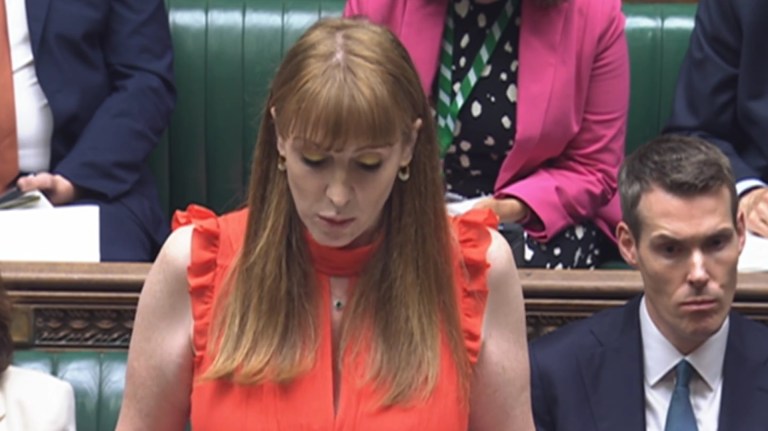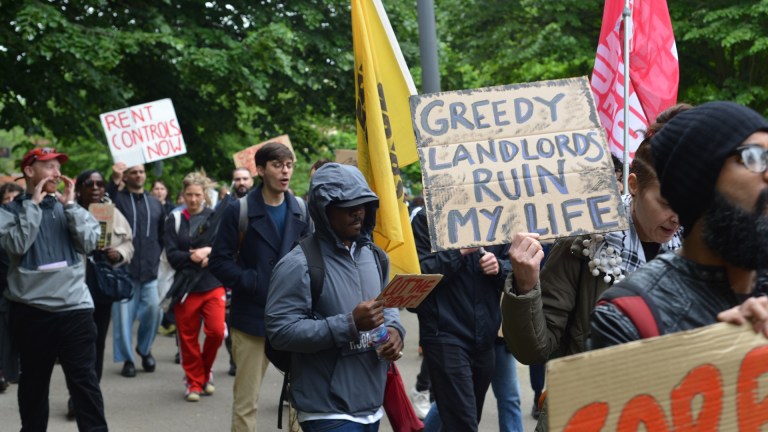“Most landlords act in a responsible way but a small number of unscrupulous ones are tarnishing the reputation of the whole sector by making the most of the housing crisis and forcing tenants into bidding wars.
“There can be no more dither and delay. We must overhaul renting and rebalance the relationship between tenant and landlord. This bill will do just that and tenants can be reassured this government will protect them.”
Much of the Renters’ Rights Bill builds on the Tory bill that came before it.
The legislation promises to give renters more rights to keep a pet – a request that a landlord cannot unreasonably refuse – while prospective tenants will not be able to be blocked from renting a home if they are on benefits or have children.
A new private rented sector database will also be created to help landlords understand their obligations, tenants gain information ahead of a new tenancy and councils to focus enforcement where it is neededt.
A new ombudsman service will also be created for renters to solve issues without the need to go to court.
Tom Darling, director of the Renters’ Reform Coalition, said: “We commend officials and ministers for working hard to ensure this is one of the first pieces of legislation introduced in this parliament – the scale of the renting crisis certainly demands it.
“This is a stronger piece of legislation than the previous attempt, it includes longer eviction notice periods and a longer eviction-free ‘protected period’ from the start of a tenancy. We renter groups have been consistent in calling for these, and though there are still areas for improvement, the fact that this government has listened means that a lot of renters will benefit from increased security of tenure.”
But the Renters’ Rights Bill also brings a few new measures to the table. Here are the key differences from the Renters Reform Bill.
Labour has responded to calls from pro-renter campaigners to get on with scrapping no-fault evictions – bringing the legislation to the Commons just 68 days after taking power.
The bill will also axe the eviction mechanism for both new and existing properties as soon as it comes into force, ending renters’ long wait for greater protections from losing their home and facing homelessness.
This differs from the Conservatives’ approach after they said courts would be reformed before no-fault evictions would be finally removed from some tenancies.
The Tories were criticised for the move with detractors arguing that it was a delaying tactic and questioning why reforms hadn’t taken place in the long wait for the legislation to be delivered.
Concerns over how the courts will cope remain. “The end of section 21 ‘no explanation’ repossessions represents the biggest change to the sector for over 30 years,” said Ben Beadle, chief executive of the National Residential Landlords Association.
“Once the bill is passed, it is vital that sufficient time is provided to enable the sector to properly prepare. Over 4.5 million households will need tenancy agreements updating, letting agent staff and landlords will need to undertake training and insurance and mortgage providers will need to adjust policies and rates. None of this will happen overnight and the government needs to publish guidance.
“In addition, ending section 21 will leave the courts needing to hear possession claims where landlords have a legitimate reason. The cross-party housing select committee has warned that without reforms to ensure the courts process cases much more swiftly, they risk becoming overwhelmed. This will not serve the interests of tenants or landlords seeking justice.”
The Renters’ Rights Bill promises to introduce Awaab’s Law to the private rented sector
The Conservative government introduced Awaab’s Law to force social housing landlords to fix hazards to stricter timelines following the tragic death of toddler Awaab Ishak.
Ishak died in 2020 following exposure to damp and mould at his family’s home in Rochdale. His case, alongside campaigning from Kwajo Tweneboa, put the state of social housing on the agenda.
The Tories, however, opted not to extend Awaab’s Law to the private rented sector despite renters living in generally lower quality homes.
Just over a fifth of renters live in non-decent homes, according to the English Housing Survey, with 10% living in homes with damp. Private renters are more likely to live in a home with the most serious hazards – more than 500,000 (12%) are living with a category one hazard compared to 9% of owner occupiers, 5% of local authority renters and 3% of housing association tenants.
The Renters’ Rights Bill will follow the Tories’ lead by applying a decent homes standard to the private sector. Landlords who fail to address serious hazards can be fined up to £7,000 by local councils and may face prosecution for non-compliance.
But it will also bring in Awaab’s Law, promising to set “clear legal expectations” about the timeframes within which landlords in the private rented sector must make homes safe where they contain serious hazards.
Beadle said: “Too often the actions of a minority of rogue and criminal landlords have brought the sector into disrepute. We therefore support measures to ensure every rental home is of a decent quality, and swift action is taken where standards threaten the health of tenants. However, this all needs to be backed up with robust enforcement by councils.”
The Renters’ Rights Bill has more measures to prevent rising rents
The Tories’ Renters Reform Bill was noticeably lacking in measures to combat rising rents at a time when the amount tenants have been paying has hit record-high levels.
The Renters’ Rights Bill does have some more measures to deal with spiralling costs but does not go far enough, according to the Renters’ Reform Coalition.
Labour’s bill will seek to ban bidding wars between tenants with landlords and letting agents required to publish an asking rent for a property and banned from accepting any bids above the price.
The bill will also look to ban in-tenancy rent increases written into contracts to prevent landlords from hiking rents to push out current tenants. Landlords will only be permitted to raise the rent once a year to the “market rate”.
Darling called for rent controls to be implemented to cap rents.
Average private rents increased by 8.6% in the year up to July 2024, according to the Office for National Statistics, after surging to record highs in recent years.
The rate at which rents have been rising has been slowing in recent months, suggesting that renters are hitting the limits of what they can afford.
“This draft law has little to say about one of the biggest issues facing renters – cost,” he said.
“‘Economic evictions’ through rent rises are a major factor in homelessness and insecurity. We will continue to call for a cap on rent increases within tenancies, to keep more renters in their homes for longer. With rents rising at record levels, the government knows it will need answers on the affordability question.”
The Renters’ Rights Bill should actually likely to make it into law
With a sizeable majority and a manifesto promise to scrap no-fault evictions immediately, it’s likely that 11 million renters in England won’t be waiting too much longer for Labour’s reforms.
The Renters’ Reform Bill also came from a 2019 Conservative manifesto promise to scrap no-fault evictions.
Tory infighting and efforts to “appease landlords” saw the bill stall but Labour’s replacement should not face the same opposition.
Now it’s on Rayner and housing minister Matthew Pennycook, who will be leading in taking the law through parliament, to live up to the promise of “no dither and delay”.
Do you have a story to tell or opinions to share about this? Get in touch and tell us more. Big Issue exists to give homeless and marginalised people the opportunity to earn an income. To support our work buy a copy of the magazine or get the app from the App Store or Google Play.









